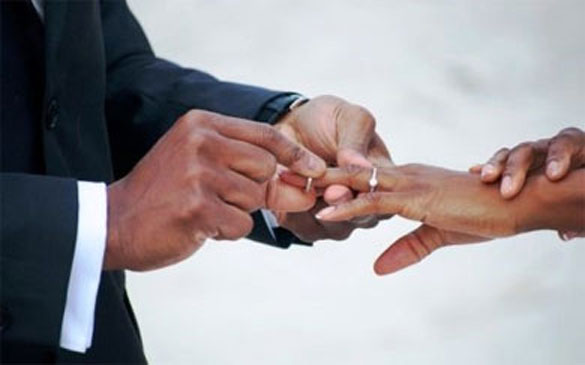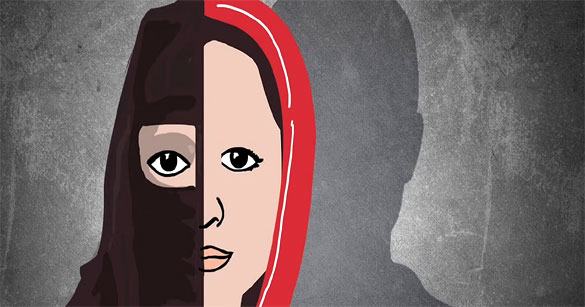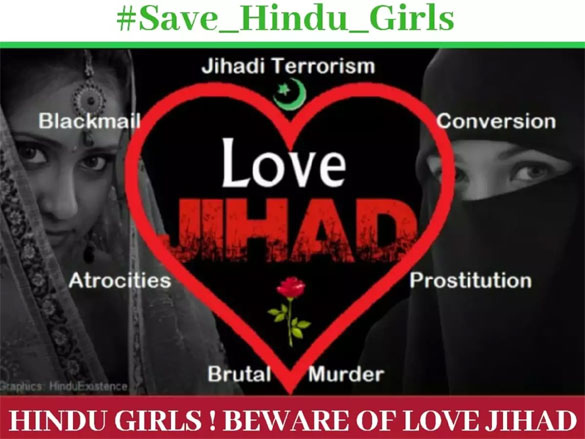
By Arshad Alam, New Age Islam
28 November 2020
In the wake of ‘love jihad’ ordinance promulgated by the Uttar Pradesh government and many other BJP ruled states announcing their desire to do the same, we have a perfect example of how something which has no empirical basis can find huge traction, not just in law but even in the imagination of people. The UP ordinance does not use the word ‘love jihad’ and understandably so because the term has no basis in law. Instead, it uses the phrase ‘Prohibition of Unlawful Conversion Bill 2020’. One of the clauses includes ‘alluring into marriage’ as sufficient ground for invalidation of marriage. Clearly then, it is targeted at potential inter-religious couples which is seen as an anathema by the majority in Indian society. In making this age old Indian prejudice into a law, the state of Uttar Pradesh is only playing to the old majoritarian fears in this country.

The ordinance is justified in the name of stopping religious conversion. But anti-conversion laws already exist in different parts of the country. There is already a prohibition in force if any religious conversion is done on the grounds of ‘force, coercion or deceit’. We even have discriminatory laws in place to check conversion into Islam and Christianity. Thus if a Dalit becomes a Muslim or a Christian, she loses all the benefits that might accrue from a Dalit identity. What then is the need for another law? Clearly then, the new law is specifically designed to punish those who want to marry outside their religious community. By making conversion for the purpose of marriage a criminal offense, the law sends a clear warning to all those who want to break free of their religious boundaries. The state in the third world was always meant to play a modernising role with the law as its barometer. What we are witnessing today is the very regression of that principle. The state is fast becoming the repository of all things medieval and conservative.
By keeping terms such as ‘allurement to marriage’ deliberately vague, the real use of the law lies in its misuse, which will be widespread. It will empower the police and other law enforcement agencies to exercise their arbitrary power of blackmailing and arrest. The law is also religiously neutral in the sense that it will criminalise all inter-religious conversions but we know that the real intent of the law is to punish potential marriages between Muslim men and Hindu women. In the name of protecting Muslim women, this government targeted Muslim men by criminalising triple talaq and in the name of protecting Hindu women, it will similarly target Muslim men for ‘luring’ Hindu women into marriage. Any Muslim man wanting to marry outside his community will have this law to deter him from doing so. And that it is precisely what this law wants to achieve: that Muslim men become fearful of even entertaining any thought of having any liaison with Hindu women.

Earlier, we saw this in Gujarat and other places where Muslim men were excluded from the Dandiya and other convivial celebrations. The objective was always to keep community boundaries separate; the passion of youth was understood as a force which had the potential of destabilising the old order. This obsession with purity was coterminous with a certain caste location. In this scheme of things, the Muslim was always the perennial Malecch, the impure, dirty outsider, whose very presence would pollute the sacred boundaries. But the mere fact of being an outsider also made the Muslim as the desired other. To make matters worse, the Muslim was not just an outsider, he was in reality an insider-outsider and therefore his very presence was understood as tempting and threatening at the same time. Muslim men were therefore portrayed as having a voracious sexual appetite, only interested in producing babies by preying on more and more women. And such thinking about Muslims was not just the preserve of the Hindu right, but was drilled into popular consciousness multiple writers, many of whom were celebrated by the erstwhile secular Indian consensus.
Even before the BJP made this into an electoral and political issue, the sentiment that Muslim men were after the womb of Hindu women with the express purpose of producing more Muslim babies, had become widespread, especially in the region of western Uttar Pradesh. Historians like Charu Gupta have documented how this fear of the ‘loss of our women’ was one of the important factors in the mobilization of Hindu sentiments against Muslims. More recently Aparna Vaidik has shown how through pamphlets, during the 1920s, the Hindu imagination was drawn towards the ‘lustful’ Muslim, all in the name of protecting Hindu women. Through these pamphlets, Hindus were warning each other of the presence of Muslim men in their body politic, and how this presence posed a threat to their women. This was nothing but a concern for racial purity, the Muslim being seen as immoral yet virile potential violator. And certainly this concern with racial purity has historical linkages with certain castes in this country.

The specific contribution of the Hindu right was to link such notion of Muslim masculinity with their religion and attribute every act of Muslims with a religious motive. Thus Muslim men were on the look-out for Hindu women, not just for satisfying their own sexual lust but also for converting them to the cause of Islam. The possession of Hindu women’s body was understood as a sort of religious victory for Islam. The fact that such regressive laws have widespread acceptance within the Hindu society is because such ideas about Muslims have been around for many years. All that the Hindu right is doing is building upon those old stereotypes in an effort to refashion Hinduism as a religion which needs to be saved from Islam. One must add that the insistence of many Muslim men to change the religion (and name) of their would-be non-Muslim wives has not helped either. But that is another story for another time.

Ultimately, it is the Hindu women’s body over which this new Hinduism will encode itself. Policing women have been the favourite past of right wing politics, be it Hindu or Muslim, and so it is not surprising that the UP government is always preoccupied with protecting women’s ‘honour’. And one of the many ways in which women’s honour has been protected in this country is to deny them any agency. What is the point of choosing or even thinking when the whole state apparatus is there to do it for you? If young Hindu men and women start to surrender their sovereignty of making even intimate choices to state, then we are really headed for dark times. Much like Islamization amongst Muslims, it is Hindu women who will have to bear the direct consequences of such community and state policing. And it is they, along with like-minded Hindu men, who should be at the forefront of opposing such a regressive law.
------
Arshad Alam is a columnist with NewageIslam.com
New Age Islam, Islam Online, Islamic Website, African Muslim News, Arab World News, South Asia News, Indian Muslim News, World Muslim News, Women in Islam, Islamic Feminism, Arab Women, Women In Arab, Islamophobia in America, Muslim Women in West, Islam Women and Feminism

No comments:
Post a Comment